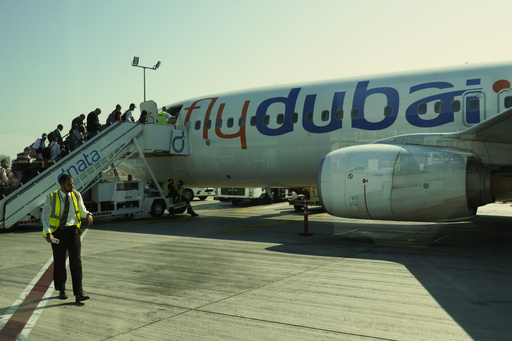
“`html
BEN GURION INTERNATIONAL AIRPORT, Israel — The prolonged conflict in Israel has significantly impacted operations at Ben Gurion International Airport. The site has seen numerous flight cancellations from global airlines, leading to a noticeable reduction in passenger traffic. In contrast, images of hostages in Gaza remind the few arriving passengers of the ongoing crisis, even as one check-in desk remains busy with travelers heading to the United Arab Emirates. This destination has become a crucial link for Israelis seeking international connectivity amidst the turmoil.
The flights to the UAE not only serve the practical needs of travel but also highlight the growing diplomatic relationship between the two nations, a partnership that has endured despite the regional conflicts. Political analysts agree that the frequency of these flights sends a strong economic and political message. “They are the primary foreign airlines continuously operating,” remarked Joshua Teitelbaum, a Middle Eastern studies expert at Bar-Ilan University.
Since the outbreak of hostilities following Hamas’s surprise assault on Israel on October 7, 2023, many international carriers have fluctuated in their flight operations, frequently pausing services out of safety concerns. The memories of previous aviation tragedies, such as the downing of Malaysia Airlines Flight 17 and Ukraine Flight 752, loom large for airline executives. Despite this, FlyDubai, along with Abu Dhabi’s Etihad Airways, has maintained a consistent flight schedule, facilitating travel and trade for Israelis.
For the UAE, this decision to keep flights operational is not just politically symbolic but also economically advantageous, particularly benefiting FlyDubai during a challenging time for the aviation industry. Many airlines, including Delta and Lufthansa, have ceased operations after initial attempts to fly following the outbreak of hostilities. Tensions have escalated following missile attacks and retaliatory strikes, leading to increasing apprehension among carriers.
Meanwhile, as international airlines reconsider their operations, Israel’s national carrier, El Al, has experienced a resurgence. The airline reported record earnings in its most recent financial statements, achieving a profit of $227 million for the half-year, a significant rise compared to the prior year’s figures. This success comes despite a challenging environment, as competing carriers have opted out of the market, raising ticket prices for remaining services. Ben Gurion Airport has reported a dramatic decrease in passenger volume during this period.
Nevertheless, FlyDubai has remained a steadfast presence, operating over 1,800 flights since the outbreak of hostilities, with only a few cancellations. On a recent busy day, travelers waiting at the FlyDubai check-in shared sentiments about the flights being a testament to the Emirates’ desire for peace.
Etihad has also sustained its operations to Tel Aviv, though it has fewer flights compared to FlyDubai, which commands a 3.6% market share at Ben Gurion, while El Al holds a significant 43.2%. Several other low-cost airlines have halted their flights during the conflict, amplifying FlyDubai’s role in maintaining connectivity for travelers.
In statements regarding their operations, Etihad emphasized a commitment to safety while maintaining service between Abu Dhabi and Tel Aviv. “Ben Gurion International Airport remains operational with essential safety measures in place,” the airline communicated, affirming its resolve to serve as a vital link as conditions permit.
The financial implications are intertwined with the broader political landscape, particularly following the 2020 normalization of relations between the UAE and Israel, under agreements known as the Abraham Accords, facilitated by then-President Trump. Although the UAE has voiced criticism regarding Israel’s military actions, it continues to engage diplomatically, with embassies and consulates remaining functional.
Despite heightened scrutiny regarding Israel’s ongoing military operations, Dubai International Airport has diminished visible promotion for flights to Tel Aviv. Travelers now navigate through increased security measures at the airport, reflecting heightened tensions in the region. Nonetheless, the presence of Hebrew and Arabic in the lines at check-in underscores the ongoing relationship.
Dina Esfandiary, a senior advisor at the International Crisis Group, articulated that the continuation of flights embodies the UAE’s commitment to its relationship with Israel, independent of geopolitical fluctuations. “No matter how the situation evolves, the UAE considers this relationship beneficial,” she noted.
“`
